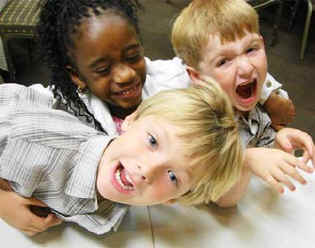Discipline Ideas for Church and Sunday School
No discipline seems pleasant at the time, but painful. Later on, however, it produces a harvest of righteousness and peace for those who have been trained by it. Hebrews 12:11
 Discipline is a word that often conjures up images of time-outs, withdrawing rewards, and other negative experiences. On the other hand, to be known as someone who is disciplined, tells others that you are a responsible person, someone who is dependable. Disciple, the root of these two words, is defined as a person who is a student, or who follows the teachings of another, as did the twelve disciples who followed Jesus
Christ's teachings, and millions of others who followed him, and continue to follow him today.
Discipline is a word that often conjures up images of time-outs, withdrawing rewards, and other negative experiences. On the other hand, to be known as someone who is disciplined, tells others that you are a responsible person, someone who is dependable. Disciple, the root of these two words, is defined as a person who is a student, or who follows the teachings of another, as did the twelve disciples who followed Jesus
Christ's teachings, and millions of others who followed him, and continue to follow him today. To become a faithful disciple of Jesus requires discipline in order to become disciplined in our faith. However, how do we as teachers achieve this in our classrooms without negative feelings being transferred to the children we teach? And does this mean we should never use timeouts or withhold rewards to avoid upsetting our kids?
Over the past decade, our children's ministry has tried several techniques to engage children in lesson time to mitigate negative behavior, thereby preventing the need for negative discipline.
This accomplishes two things: first, we are not focusing on the bad behavior of a few kids and rewarding them with our attention. Second, the behaving children are given the attention they deserve. The challenge is making sure all the well-behaved children are tickled. It works best for the teacher's assistant to use the wand, rather than the teacher who is instructing. To insure loving attention and guidance, it helps to have a ratio of five students to one teacher or assistant. Assistants should arrange themselves among the group of students to give gentle reminders to children to pay attention and redirect them when they are distracted.
For older children we use a similar technique. Rather than using the wand, our assistant teacher hands out Bible Bucks for behaviors that are positive, such as listening attentively, answering questions, showing kindness, raising hand to answer or ask questions, Bible memorization, etc. As children behave well, the assistant teacher places the Bible Bucks in front of them. Bible Bucks can be taken away for touching or counting the money or misbehaving. At the end of the lesson time, or the semester, children are allowed to "cash in" their Bible Bucks for small prizes in our "color-coded store," or they can bank them and save up for items that are more expensive. (We use index cardholders for their banks and label them with their names. The store prizes are marked with color-coded stickers to indicate their value, e.g. blue=$10, yellow=$20, etc.)
We have found the most effective way to keep discipline in check is to use Bible curriculum that engages children. One way is by acting out the Bible story and recording it. Recording tends to bring out the children's best behavior! Especially when they know their parents will see it! Other active participation methods include using puppets, drawing the Bible story as the teacher narrates it, and using Bible games and Christ-centered crafts to reinforce the lesson. The more ways a teacher involves students, the less likely behavioral problems arise.
If you find that none of these methods work, removing a disruptive child from the classroom or sitting them in timeout might be necessary, but it should be rare and never the first course of action. In fact, more often than not, if children are disruptive, the teaching approach should be carefully reconsidered and changed to meet the needs of the children in your charge.
Our goal as teachers is to help children understand how much God loves them. They need to understand the importance of discipline; without it, they will not become disciplined disciples of the faith and learn of the wonderful plan God has for their lives!
Copyright 2011/2018 Sarah Keith
SundaySchoolNetwork.com
Subscribe to our Newsletter - Learn More